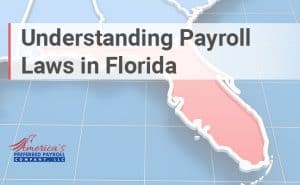Payroll taxes are the taxes that are withheld from your employee’s paychecks and are the taxes you are required to pay as an employer based on your employee’s wages. These taxes include:
- Social Security and Medicare
- Federal and State Unemployment
- Federal and State Personal Income Tax
- Other State Taxes
Understanding Payroll Taxes
Social Security & Medicare Taxes
Paid by both employers and employees. As an employer, you withhold the employee’s part of the taxes and must also pay the federally regulated amount your company is responsible for.
The tax rate (amount withheld) for social security, as of 2018, is set at 6.2% and applies to both employees and employers. This is a tax with a wage cap, which means that the tax is calculated only up to a maximum dollar amount of wages per employee each year. For 2018, the wage cap for social security is $128,400.
The employee tax rate (amount withheld) for Medicare is 1.45% for most employees. The employee Medicare rate increases to 2.35% on wages over $200,000. The employer tax rate for Medicare tax is set at 1.45% regardless of wage amounts. There is no wage cap for Medicare tax, which means the tax is paid on all of the wages that the employee earns. (The only exception is for exempt employee wages. See “Special Tax Exemptions” below for more information.)
Income Taxes
The amount of federal income tax (FIT) withheld from employees’ paychecks depends on their marital status, the number of withholding allowances (exemptions) they claim on Form W-4, pay frequency and their projected annual income. In addition, all but nine states have a personal income tax (PIT) (exceptions are Alaska, Florida, Nevada, New Hampshire, South Dakota, Tennessee, Texas, Washington, and Wyoming). It can be a flat tax rate (as in Illinois), regardless of projected income, or a graduated tax rate based on annual income, such as FIT. In some states, employees can also pay local tax (to cities, counties, or school districts) from their paycheck.
Federal Unemployment Taxes
The Federal Unemployment Tax Act (FUTA), along with the state unemployment systems, provides for payments of unemployment compensation to workers who have lost their jobs. For 2016, 2017, and 2018, the effective FUTA tax rate is 6.0%. However, most employers qualify for the 5.4% state unemployment tax credit, which lowers the effective rate to 0.6%. The tax applies to the first $7,000 employers pay to each employee as wages during the year.
However, if any of your employees are exempt from State Unemployment Insurance (for example, they are Directors or Officers), your FUTA tax may be higher. Also, if your state has borrowed funds from the federal government to cover shortfalls in its unemployment insurance program, all employers in your state may be subject to additional tax liability at the end of the year to repay those loans. For more details, see 2016 Federal Unemployment Tax Act (FUTA) Credit Reductions.
For help with your payroll contact our payroll experts today!













